 For me, the empty pages tell the story of my life becoming occupied with things I never suspected would lead me from the corner booth at the coffee shop into the consuming risk and mess and joy and inertia of marrying a woman who beckons me out of isolation, of raising four beautiful and uniquely complex children, of moving from one city to another, of living in a community, and of following a vocation which, ironically, involves more writing than ever.
For me, the empty pages tell the story of my life becoming occupied with things I never suspected would lead me from the corner booth at the coffee shop into the consuming risk and mess and joy and inertia of marrying a woman who beckons me out of isolation, of raising four beautiful and uniquely complex children, of moving from one city to another, of living in a community, and of following a vocation which, ironically, involves more writing than ever.
 Most days of the year, I wear worn blue jeans, a soft grey T-shirt, and old tennis shoes — a sharp contrast to my derby attire. I like grey: it suits my personality and my desire to keep things safe and simple. But looking back on my collective experiences, I recognize there is a hot-pink narrative thread that runs throughout my story, stringing together all of the things that thrill me most in this world. It connects me to an adventure that is more exciting than one I have envisioned for myself.
Most days of the year, I wear worn blue jeans, a soft grey T-shirt, and old tennis shoes — a sharp contrast to my derby attire. I like grey: it suits my personality and my desire to keep things safe and simple. But looking back on my collective experiences, I recognize there is a hot-pink narrative thread that runs throughout my story, stringing together all of the things that thrill me most in this world. It connects me to an adventure that is more exciting than one I have envisioned for myself.
 In this world where news of torture and death runs like a ticker through my day, I’m realizing in a new way that I must learn to pray. I must learn to sit in silence with a God who is all-powerful and all-loving in the mystery of horrendous suffering. I must learn to lift up my sisters and brothers without ceasing. I must learn to pray ordinary prayers for them in my small way and believe that God makes those prayers matter.
In this world where news of torture and death runs like a ticker through my day, I’m realizing in a new way that I must learn to pray. I must learn to sit in silence with a God who is all-powerful and all-loving in the mystery of horrendous suffering. I must learn to lift up my sisters and brothers without ceasing. I must learn to pray ordinary prayers for them in my small way and believe that God makes those prayers matter.
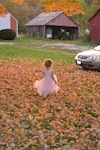 There is a tension here that my husband and I find important as parents. As our life on a farm begins to mirror the lives of some of our ancestors who had closer connections to death, food, seasons, and the rhythm of days, our family has been given many opportunities to experience both a spiritual and a literal darkness that cannot be eliminated. We try not to shield our children from every hurt and pain. But we also encourage them in their imaginations, giving them a framework for hope and allowing them to “escape into” the longing for the not-yet that literature can bring.
There is a tension here that my husband and I find important as parents. As our life on a farm begins to mirror the lives of some of our ancestors who had closer connections to death, food, seasons, and the rhythm of days, our family has been given many opportunities to experience both a spiritual and a literal darkness that cannot be eliminated. We try not to shield our children from every hurt and pain. But we also encourage them in their imaginations, giving them a framework for hope and allowing them to “escape into” the longing for the not-yet that literature can bring.
 yet we have in our soil
yet we have in our soil
an inexhaustible mine
of true wealth,
the foundation of a nation’s
greatness,
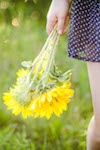 Sometimes it’s a shoulder or a hand combing through hair. Always it’s a simple gesture or posture that says something about the person that the whole face never could. And I love that. I love the faceless portrait.
Sometimes it’s a shoulder or a hand combing through hair. Always it’s a simple gesture or posture that says something about the person that the whole face never could. And I love that. I love the faceless portrait.
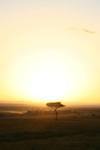 I watch the world through tinted glass — and often don’t really see it. I close the windows to control the climate and keep the gnats — and the world — at a distance. I drive past the same homeless woman walking our sidewalks several times a week, and have I ever stopped the car to chat? Only twice in nine years. My car is large and strong, and it insulates me from the world like an armored vehicle.
I watch the world through tinted glass — and often don’t really see it. I close the windows to control the climate and keep the gnats — and the world — at a distance. I drive past the same homeless woman walking our sidewalks several times a week, and have I ever stopped the car to chat? Only twice in nine years. My car is large and strong, and it insulates me from the world like an armored vehicle.
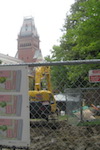 I am always seeking to hone my technique, to generate new and creative ideas, to find a different way of looking at the world. But like the construction workers, I have to build on what’s already there. I have to strike a balance, uneasy though it may be, of honoring the strength of the old, and creating a little chaos to bring in the new.
I am always seeking to hone my technique, to generate new and creative ideas, to find a different way of looking at the world. But like the construction workers, I have to build on what’s already there. I have to strike a balance, uneasy though it may be, of honoring the strength of the old, and creating a little chaos to bring in the new.
 I could probably find a way to heat treat everything else as well. Not only my food, but my home and my relationships. I could boil my garden vegetables, throw money at my old house, distance myself from friends and family and neighbors. I could fence my children in with a hundred thousand rules.
I could probably find a way to heat treat everything else as well. Not only my food, but my home and my relationships. I could boil my garden vegetables, throw money at my old house, distance myself from friends and family and neighbors. I could fence my children in with a hundred thousand rules.
Then they would be safe. Then they would be contained. Then they would no longer have the power to break my heart.
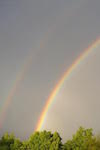 It was a few weeks into the class that I suddenly felt as though I was in the ocean, treading water with seasoned and well-equipped scuba divers. The language was the water surrounding me, warm and inviting, salty and buoyant but dark below. It was the darkness that drew me. As much as I tried to get in touch with the text, with the loss of Eden, I felt drawn to the darkness below and I swam in that.
It was a few weeks into the class that I suddenly felt as though I was in the ocean, treading water with seasoned and well-equipped scuba divers. The language was the water surrounding me, warm and inviting, salty and buoyant but dark below. It was the darkness that drew me. As much as I tried to get in touch with the text, with the loss of Eden, I felt drawn to the darkness below and I swam in that.
 So far, I’d only added dirt, bone meal, and periodic water, then parked the cans in a sunny spot to see what happened. Yet thanks to this minimal work, green shoots were already seeking the sun, requiring me to add almost daily scoops of more dirt to cover the rapidly growing stems. Water plus dirt made mud in most other settings, but here were these plants, charting almost miraculous growth despite so little work on my part.
So far, I’d only added dirt, bone meal, and periodic water, then parked the cans in a sunny spot to see what happened. Yet thanks to this minimal work, green shoots were already seeking the sun, requiring me to add almost daily scoops of more dirt to cover the rapidly growing stems. Water plus dirt made mud in most other settings, but here were these plants, charting almost miraculous growth despite so little work on my part.
Maybe I grew like that too.
 This is a lonely posture, but letting people in can hurt, bruise, bewilder. Looking into another's eyes and seeing myself there means encountering not just that person and their messes, but my own. It means I have to stare my own presence down and feel that pinch in my chest, that thickness in my throat. I have to face the former me because someone knew me then, knows me now, and if we both stick around, will know me in the future. That is love, and it is tricky.
This is a lonely posture, but letting people in can hurt, bruise, bewilder. Looking into another's eyes and seeing myself there means encountering not just that person and their messes, but my own. It means I have to stare my own presence down and feel that pinch in my chest, that thickness in my throat. I have to face the former me because someone knew me then, knows me now, and if we both stick around, will know me in the future. That is love, and it is tricky.
To know someone else, to love someone else, is to lose myself a little.
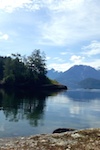 And then, for the first (of many) profoundly healing moments of the weekend, I realized that I was temporarily untethered. But not untethered in the Sandra-Bullock-out-in-space sort of way. Instead of feeling distress or loneliness, I felt an unfamiliar sensation that it was just me here. I remembered that I exist. Not only that, but I felt relieved and surrounded by the acceptance of God. Nobody calling. Nobody for me to check on or take care of. No Twitter feed. No e-mails waiting with exclamation points.
And then, for the first (of many) profoundly healing moments of the weekend, I realized that I was temporarily untethered. But not untethered in the Sandra-Bullock-out-in-space sort of way. Instead of feeling distress or loneliness, I felt an unfamiliar sensation that it was just me here. I remembered that I exist. Not only that, but I felt relieved and surrounded by the acceptance of God. Nobody calling. Nobody for me to check on or take care of. No Twitter feed. No e-mails waiting with exclamation points.Summer Lake
But Summer Lake offers me something neither of those places ever can — the expanse of wilderness. Every day we surround ourselves with manmade structures and agendas and priorities set by us, the human beings. When you venture into those wetlands you are reminded again that an entire world happens out there without you, every day, every season of the year. Staggering, beautiful, abundant life. The peace of wild things.
 My involvement is about being the guy behind the thing that says, “Pay attention to this.”
My involvement is about being the guy behind the thing that says, “Pay attention to this.”
If I can be the person that directs others to a special thing, I’m perfectly fine and I like that anonymity. That’s my own job well done.
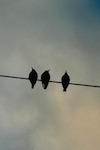 Sabbath-keeping is a sturdy axis when the storms of life threaten spring’s hope. The choice of rest when responsibilities pile up seems counterintuitive, yet carving out routine time periods with the Creator provides a steady center while life continues spinning.
Sabbath-keeping is a sturdy axis when the storms of life threaten spring’s hope. The choice of rest when responsibilities pile up seems counterintuitive, yet carving out routine time periods with the Creator provides a steady center while life continues spinning.
It is when we cannot control outcomes that the depth and breath of trust becomes revelation.
 It was in rereading the poems, though, that the poetry got left behind. I started reading these poems as prayers. And not prayers of the animals, but prayers for myself. These are prayers I would never know how to say, for the creature-like movements inside of me are intrinsically inarticulate. These poems are prayers for the animals inside of us — the heavy, slow, frightful, instinctive — those parts of us that fly and plod and bury down.
It was in rereading the poems, though, that the poetry got left behind. I started reading these poems as prayers. And not prayers of the animals, but prayers for myself. These are prayers I would never know how to say, for the creature-like movements inside of me are intrinsically inarticulate. These poems are prayers for the animals inside of us — the heavy, slow, frightful, instinctive — those parts of us that fly and plod and bury down.
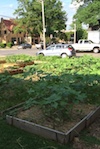 When I saw my garden plot I was surprised at the way it seemed both small and large.
When I saw my garden plot I was surprised at the way it seemed both small and large.
I got to spot the blossom first. Judy first spotted the cluster of green cherry tomatoes, and texted me a photo. I look forward to watching their reddening, and to the day of harvest, to that first burst of pure sunlight in my mouth. But the yield is not high in my goals. Neither, any more, is the work of emptying my mind and dirtying my fingernails.
My primary goal in sharing this garden is to yield to the Overseer’s soul amendments.
 My experience has been that I mistake seasons of “creative dryness” for a season in which it is time to make something else. So, rather than simply waiting for the next moment of inspiration or the next deadline to move you into creative work, move yourself out of your normal discipline and do some painting, drawing, shooting, playing, etc. After all, you are a creature who creates — that is the core of who you are. What you make is secondary.
My experience has been that I mistake seasons of “creative dryness” for a season in which it is time to make something else. So, rather than simply waiting for the next moment of inspiration or the next deadline to move you into creative work, move yourself out of your normal discipline and do some painting, drawing, shooting, playing, etc. After all, you are a creature who creates — that is the core of who you are. What you make is secondary.
The Place of Our Affection
With all of this in our hearts, we got in the car and left the hotel, returning home to what we love. Before long, the acute stages of family emergency had passed and everyone moved on to more permanent situations. As things returned to a more normal state, I found myself feeling more placed than ever, letting go of questions about the future and digging in to life as I know it right now.
















